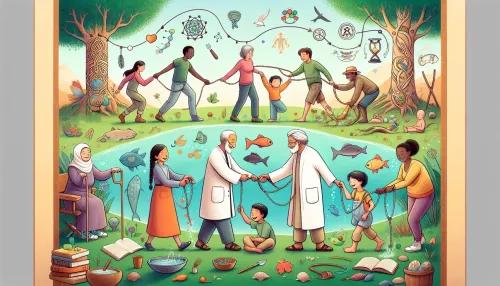
The Art of Adaptation: Modernizing Autism Support with Timeless Traditional Techniques

Evolving Ancient Practices: Adapting Centuries-Old Wisdom to Cater to Modern Autistic Profiles
Ancient wisdom has long been revered for its timeless effectiveness in addressing various challenges. When it comes to supporting autistic children, the adaptation of centuries-old practices offers a promising avenue for modern intervention strategies. By integrating traditional approaches with contemporary insights, caregivers and professionals can tailor their support to better suit the unique needs of today's autistic children.
Embracing Calming Sensory Environments
One traditional concept that aligns seamlessly with modern autism support is the creation of calming sensory environments. In ancient cultures, natural elements were utilized to induce a sense of tranquility and balance. This principle finds resonance in contemporary sensory room design, where elements such as dim lighting, tactile materials, and soothing sounds are used to provide a safe haven for autistic children. HorizonsMind Blog advocates integrating these principles into modern sensory room design to create nurturing spaces for autistic individuals.
Harnessing Therapeutic Movement
Traditional practices often emphasized the therapeutic benefits of rhythmic movement. This concept can be seen in traditional dances and rituals that prioritize repetitive, soothing motions. Today, this principle is mirrored in practices like dance therapy and yoga, both of which have shown promise in promoting emotional regulation and physical well-being among autistic children. By drawing inspiration from ancient movement traditions, caregivers and therapists can incorporate purposeful movement into daily routines, contributing to holistic autism care.
Reviving Heritage: Recreating Traditional Therapies to Suit the Needs of Today's Autistic Children
The essence of traditional therapies lies in their ability to address the underlying factors contributing to a person's well-being. This fundamental approach holds promising potential for today's autism care landscape when revitalized with current understanding and methodologies.
Cultivating Beneficial Dietary Practices
In many ancient cultures, food was viewed not only as sustenance but also as medicine for the body and mind. Drawing from this perspective, modern nutritionists are exploring dietary interventions that may support autistic children's overall health and cognitive function. By aligning with traditional dietary wisdom and incorporating nutrient-rich, wholesome foods, caregivers can optimize the dietary experiences of autistic individuals, enhancing their well-being from within.
Integrating Mindfulness-Based Practices
Centuries-old mindfulness traditions have endured the test of time due to their profound impact on mental clarity and emotional regulation. Modern adaptations of mindfulness techniques offer valuable tools for promoting self-awareness and stress management in autistic children. Through HorizonsMind Blog’s advocacy for integrating mindfulness-based practices rooted in ancient wisdom, caregivers can empower autistic individuals to cultivate inner calmness amidst daily challenges.
Innovating Tradition: Translating Ancient Wisdom into Effective Tools for Autism Care
The integration of ancient wisdom with contemporary knowledge underscores the ongoing evolution of autism support strategies. By creatively reimagining traditional approaches, individuals and organizations can forge innovative pathways that align with the unique requirements of modern autistic children.
Fostering Collaborative Community Engagement
Traditional societies excelled in fostering a sense of community and interconnectedness. Drawing inspiration from such communal dynamics, modern caregivers can emphasize community engagement activities to provide holistic support for autistic children. By encouraging the cultivation of inclusive communities where autistic individuals thrive through meaningful interactions and mutual support.
Tapping into Nature-Inspired Interventions
Ancient cultures often drew inspiration from nature's healing properties. Today, this concept resonates in nature-based interventions that offer an enriching experience for autistic individuals. Incorporating elements such as horticultural therapy and outdoor sensory experiences allows for a harmonious blend of traditional reverence for nature with modern therapeutic practices.
Creatively Reimagined: Updating Traditional Approaches in Assisting Autistic Children's Development
The intersection of tradition and innovation holds transformative potential for the development of autistic children. As we creatively reimagine ancient wisdom within contemporary contexts, we unlock fresh perspectives that cater specifically to the diverse needs and capabilities of autistic individuals.
Embracing Artistic Expression
Throughout history, art has served as a profound mode of expression transcending verbal communication barriers. By incorporating traditional art forms and creative outlets into autism support programs, caregivers can empower autistic children to express themselves authentically. HorizonsMind Blog champions the inclusion of art therapy and creative pursuits inspired by timeless traditions as catalysts for personal growth and self-expression.
Nurturing Rituals of Comfort
Traditional rituals often encompassed comforting routines that provided individuals with a sense of security and predictability. This principle aligns with modern autism caregiving through the incorporation of personalized routines and comforting rituals tailored to individual preferences, promoting emotional regulation and stability.
From Past to Present: Revitalizing Ancient Techniques for Empowering Autistic Individuals
As we bridge the wisdom of the past with the demands of the present, we embark on a journey that revitalizes ancient techniques to empower autistic individuals across diverse cultural landscapes. Within this fusion lies the potential for transformative impact within autism care, ensuring that traditional wisdom remains not only relevant but indispensable for modern support systems.


